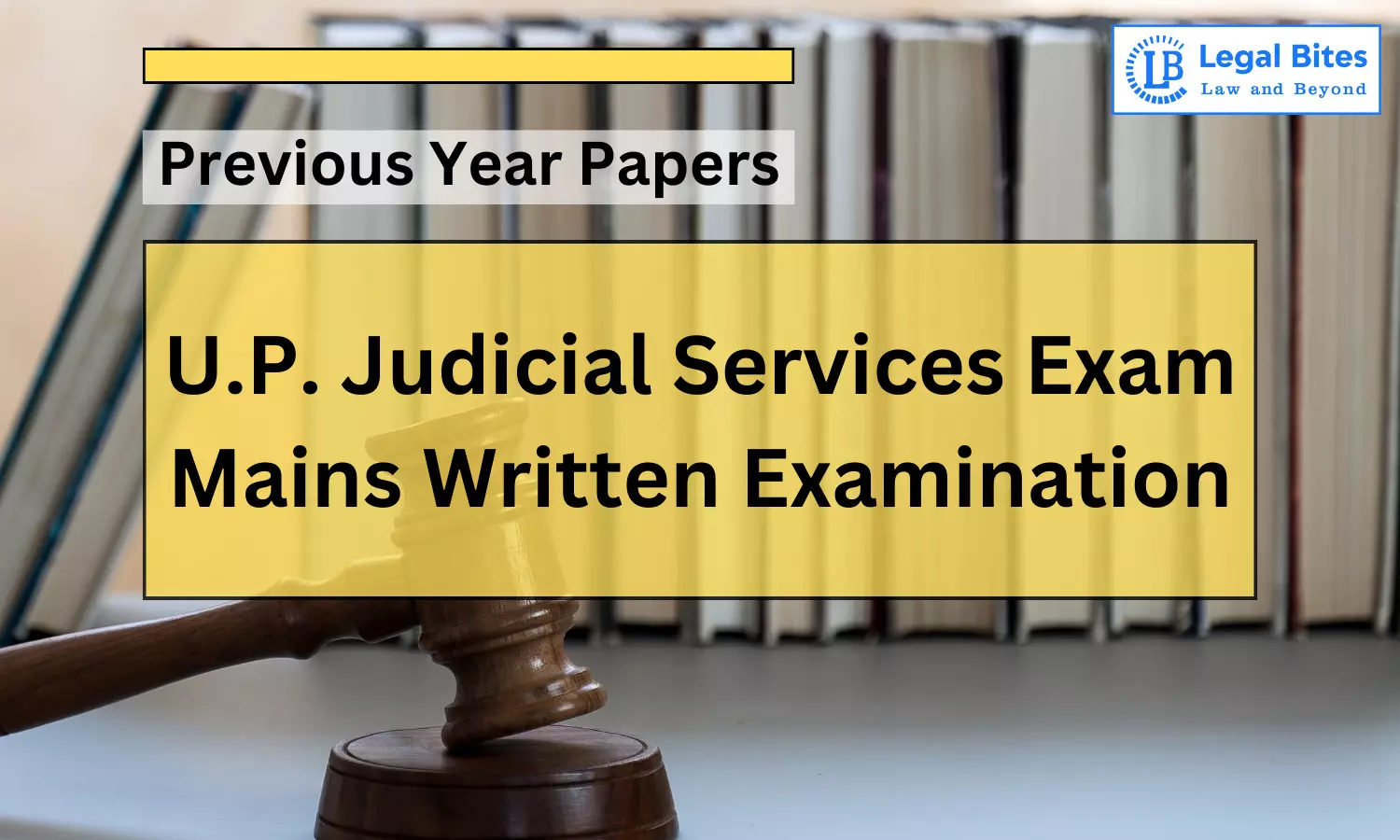U.P. Judicial Services Exam Mains 2018 Paper (Language)
Candidates preparing for U.P. Judicial Services Exam should solve the U.P. Judicial Services Exam Mains 2018 Paper (Language) and other previous year question papers before they face Prelims and Mains.

Candidates preparing for U.P. Judicial Services Exam should solve the U.P. Judicial Services Exam Mains 2018 Paper (Language) and other previous year question papers before they face Prelims and Mains. It also gives an idea about the syllabus and how to prepare the subjects by keeping the previous year's questions in mind. All toppers are mindful and cognizant of the types of questions asked by the UP PCS (J), to be aware of the various different tricks and types of questions. This should be done by every aspirant when starting their preparation. It is very important to have an overall understanding of the pattern and design of questions.
U.P. Judicial Services Exam Mains 2018 Paper (Language)
Only practising the authentic question papers will give you a real feel of the pattern and style of the questions. Here's U.P. Judicial Services Exam Mains 2018 Paper (Language). Practice and Prepare with our UPJS Mains Mock Test Series.
U.P. Judicial Services Main Written Examination 2018
(Language)
भाषा
Time allowed: 3 hrs. Maximum Marks: 200
- All Questions are compulsory.
- Marks are allotted against each question.
- Word limit in questions, wherever specified, should be adhered to.
Question 1:
Write an essay in English on any one of the following topics, not exceeding 500 words:[60 marks]
(a) Corruption in Public Life
(b) Science and Religion
(c) Violence against Women
Question 2:
Make a precis of the following passage in you own words in about one-third of its length, a suggest a suitable title to it: [58 + 2 = 60 marks]
Conversation is fine art. It is the art of exchanging thoughts. It is an art which even the least gifted of us can learn. Not everybody can paint or play music, but almost everyone can talk. Conversation, therefore, it that art which gives the greatest pleasure to the greatest number. "To talk", says R.L, Stevenson. "it our chief business in the world; and talk is by far the greatest source of pleasure. It costs nothing in money; it is all profit; it completes our education, founds maintains our friendship and can be enjoyed at any age and in almost every state of health."
Conversation is indeed the most easily teachable of all the arts. All you need to do in order to become a good talker is to find a subject that interests you and your listener. There are, for example, numerous things to talk about. But the important thing is that you must talk about the secret of your popularity. Talk to your friends about the things that interests them, and you will get a name for good fellowship, charming wit and a brilliant mind. There is nothing that pleases people so much as your interest in their interest.
It is just as important to know what subject to avoid as what subjects to select for good conversation. If you don't want to be a bore, be careful to avoid certain unpleasant topics. Avoid talking about yourself, unless you are asked to do so. People are interested in their own problems, not in yours. Sickness and death bore everybody. The only one who willingly listens to such talk is the doctor, but the gets paid for it. (293 words)
Question 3:
Translate the following passage into English: [40 marks]
प्राचीनकाल में विक्रमादित्य नाम का राजा इस देश में राज्य करता था। वह बड़ा न्यायी राजा था। आज भी लोग उसके न्याय की प्रशंसा करते हैं। एक दिन कुछ लड़के एक गाँव के निकट जंगल में खेल रहे थे। वहाँ उन्होंने एक मिट्टी का ढेर देखा जो एक पत्थर से ढका हुआ था। उनमें से एक लड़का उस पत्थर पर बैठ गया। उसने अपने साथियों को बुलाया और कहा, "मित्रों आज मैं राजा विक्रमादित्य हो गया हूँ। तुम लोग अपने मुकदमे of मेरे पास ले आओ मैं न्याय करूंगा।" उस लड़के ने अपने साथियों के मुदकमों का निर्णय किया। उसके निर्णय इतने अच्छे थे कि यह कहानी दूर-दूर तक फैल गयी। जो झगड़ा करते थे उस लड़के के पास आते थे। प्रत्येक व्यक्ति उस लड़के के न्याय से संतुष्ट होता था। जब वह मिट्टी का ढेर खोदा गया, लोगों को मालूम हुआ कि of सचमुच वह राजा विक्रमादित्य के बैठने का स्थान था।
Question 4:
Translate the following passage into Hindi: [40 marks]
Even during the brief span of our lives we have seen these two forces at play in India and the world at large—the forces of constructive and creative effort and the forces of destruction. Which will triumph in the end? And on which side do we stand? That is a vital question for each one of us, and, more especially, for those from whom the leaders of the nation will be drawn, and on whom the burden of tomorrow will fail. We dare not sit on the fence and refuse to face the issue, we dare not allow our minds to be befuddled by passion and hatred when clear thought and effective action are necessary.

